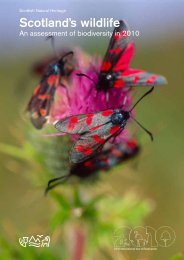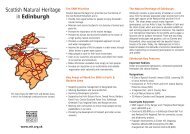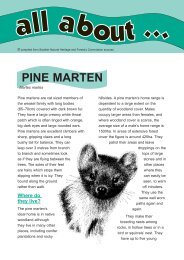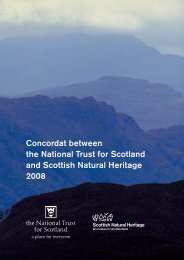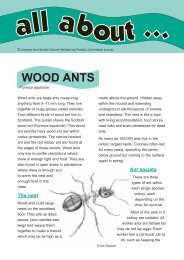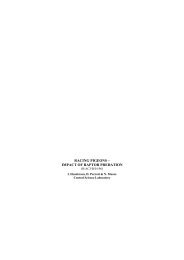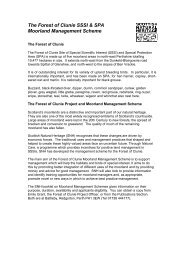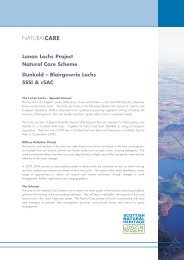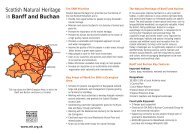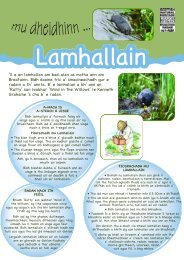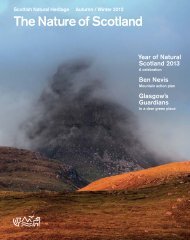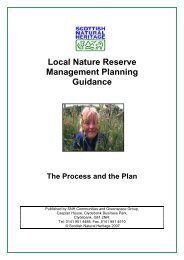Applying wildlife welfare principles to individual animals
Applying wildlife welfare principles to individual animals
Applying wildlife welfare principles to individual animals
Create successful ePaper yourself
Turn your PDF publications into a flip-book with our unique Google optimized e-Paper software.
8. DUTY OF CARE FOR WILDLIFE SPECIES<br />
8.1 Is our responsibility context dependent?<br />
Much of the literature (and many of the <strong>principles</strong>) established thus far have been developed<br />
for <strong>animals</strong> which are closely managed by humans such as production farm <strong>animals</strong>,<br />
companion <strong>animals</strong> or labora<strong>to</strong>ry <strong>animals</strong>. Before considering how we may assess and<br />
respond <strong>to</strong> the <strong>welfare</strong> status of <strong>wildlife</strong> it is important <strong>to</strong> question <strong>to</strong> what extent our<br />
responsibility may be in some sense context dependent (see also Ohl and Putman, 2013d).<br />
There has been much debate in the more philosophical literature about human<br />
responsibilities <strong>to</strong> <strong>animals</strong> and about the moral value of animal life. A significant part of this<br />
literature recognizes <strong>animals</strong> as having moral status: that is, <strong>to</strong> be an entity (a being)<br />
<strong>to</strong>wards which we can have moral duties (Warren, 1997), acknowledging that <strong>animals</strong> that<br />
fall under our responsibility are also part of our moral circle, and whether these <strong>animals</strong><br />
flourish is also our concern. In the past, perhaps, many philosophers, following a Kantian<br />
approach, presumed that such moral status derived as a consequence of their relationship<br />
with humans, as an extension of human-centred morality, but a significant number of<br />
ethicists now concede that <strong>animals</strong> have some moral value that is independent of their use<br />
by humans.<br />
According <strong>to</strong> Regan (1983), <strong>animals</strong> are, like humans, subjects-of-a-life. They have<br />
subjective experiences, can experience the quality of their lives, and enter in<strong>to</strong> and maintain<br />
relationships with others. Taylor (1986) argues that all organisms have ‘inherent worth’<br />
because, as ‘teleological centres of life’, they have a good of their own, while Rollin (2011)<br />
ascribes an intrinsic value <strong>to</strong> <strong>animals</strong> because “what happens <strong>to</strong> an entity matters <strong>to</strong> it even<br />
if it does not matter <strong>to</strong> anyone or anything else. Because it is capable of valuing what<br />
happens <strong>to</strong> it, either in a positive or negative way, such valuing is inherent in it.”<br />
In effect, although the basis for the belief may differ, many western philosophies now accept<br />
that all <strong>animals</strong> have moral status and that in consequence, and without exception, they<br />
merit moral consideration. This broad acknowledgement of <strong>animals</strong> as having moral status,<br />
however, appears not <strong>to</strong> result in one broadly shared view on how we should treat them.<br />
This is clearly reflected in current legislative provisions for consideration of <strong>animals</strong>’ <strong>welfare</strong><br />
which are in general largely context-dependent, such that there may be a clear legal<br />
distinction between responsibilities <strong>to</strong>wards farm <strong>animals</strong>, lab <strong>animals</strong>, companion <strong>animals</strong>,<br />
closely managed <strong>wildlife</strong>, and truly wild <strong>animals</strong> experiencing little management input (see<br />
for example review by Vapnek and Chapman, 2010).<br />
Partly as a reflection of that legal distinction, some authors (as, for example, Swart, 2005<br />
and Swart & Keulartz, 2011) suggest a similar distinction in relation <strong>to</strong> context (kept and nonkept),<br />
in terms of our responsibilities for <strong>animals</strong> and the way those responsibilities might be<br />
discharged. If we wish <strong>to</strong> try <strong>to</strong> claim for a wider duty of care, we may argue that at least<br />
within a European context, all <strong>animals</strong> (whatever their status as kept or non-kept) are <strong>to</strong><br />
some degree influenced by human activity – whether <strong>to</strong> a greater or lesser extent, and<br />
whether deliberate or incidental. Closely managed <strong>animals</strong> in whatever context (farm<br />
<strong>animals</strong>, labora<strong>to</strong>ry <strong>animals</strong>, companion <strong>animals</strong>) have their whole environment controlled by<br />
human agency; but even for free-ranging or apparently wild <strong>animals</strong>, their habitat and<br />
movement patterns are affected by human land-use and land-management and many<br />
populations are directly controlled by culling.<br />
Thus even in terms of those philosophical traditions which base responsibilities for <strong>animals</strong><br />
on their relationship with humans, some duty of care might be expected. In practice however<br />
such separate ‘justification’ is unnecessary if we accept the moral premise above that all<br />
22



